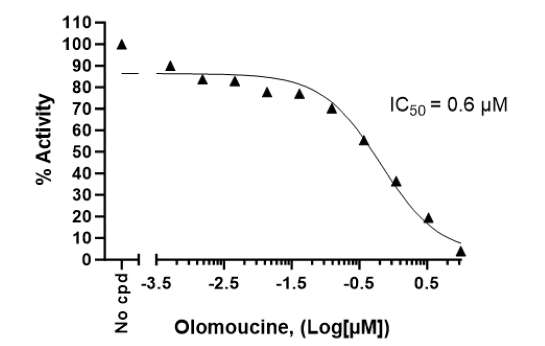Chemi-Verse™ CDK2/CyclinE1 Kinase Assay Kit
The Chemi-Verse™ CDK2/CyclinE1 Kinase Assay Kit is designed to measure CDK2 (cyclin-dependent kinase 2)/CyclinE1 kinase activity for screening and profiling applications using ADP-Glo™ as a detection reagent. The assay kit comes in a convenient 96-well format, with enough purified recombinant CDK2/CyclinE1 kinase, kinase substrate, ATP, and kinase assay buffer for 100 enzyme reactions.
- ADP-Glo™ Kinase Assay (Promega #V6930)
- DTT (Dithiothreitol), 1 M, optional
- Microplate reader capable of reading luminescence
- Adjustable micropipettor and sterile tips
- 30°C incubator
CDK2 (cyclin dependent kinase 2), also known as cell division protein kinase 2, is a member of the serine/threonine cyclin-dependent protein kinase family, and it is involved in cell cycle. CDK2 is regulated by phosphorylation and can associate with either cyclin E during G1 phase and cyclin A during S phase. Its association with cyclins induces a conformational change that results in a dramatic increase of the kinase activity. Cyclin levels vary during the cell cycle, which allow cyclins to regulate CDK activity in the cell. Dissociation of the complex returns CDK to its basal activity, and CDK is degraded by ubiquitin-mediated proteolysis. CDK2 can phosphorylate several proteins, being part of DNA damage, protein degradation, signal transduction, and other crucial cellular pathways. Lack of regulation in cell cycle can result in cancer. In general, CDK2 is not itself upregulated or hyperactive in cancer, and its abnormal activity comes from dysregulation in its binding partners. For instance, cyclin E is overexpressed and/or has abnormal activity in many cancers, including breast, lung cancer and leukemia. The development of inhibitors specific for CDK2 has been difficult, as CDKs have similar active sites, and for instance inhibition of CDK1 can be highly detrimental. The understanding of the mechanisms involved in cell cycle regulation, and its control via the use of small molecule inhibitors alone or in combination therapy will open new therapeutic avenues for the treatment of cancer and neurodegenerative diseases.
Tadesse S., et al., 2020 Drug Discovery Today 25(2):406-413.


